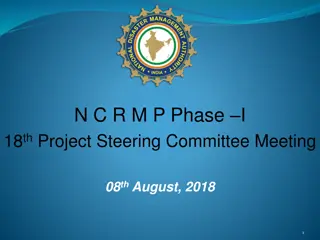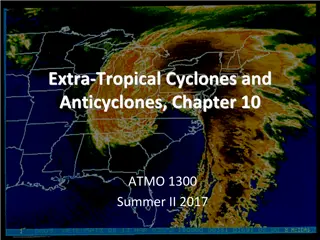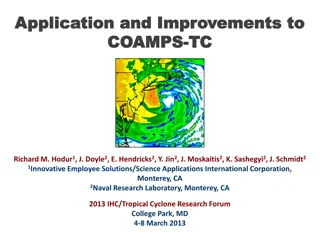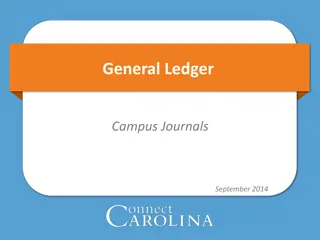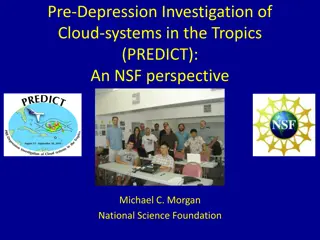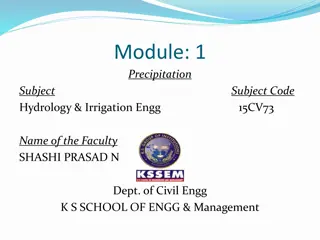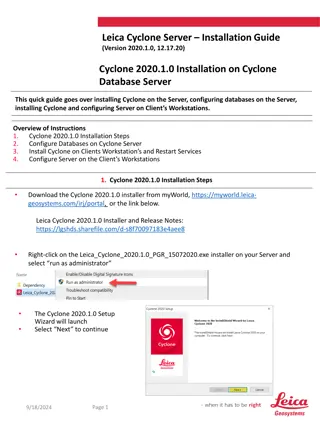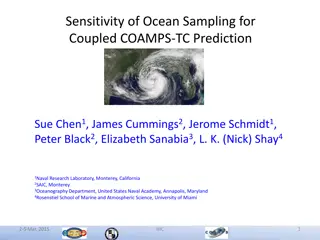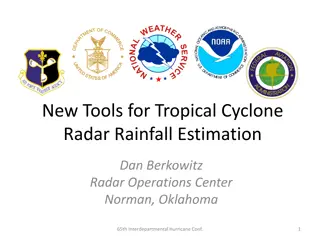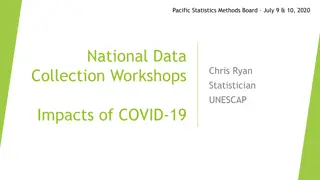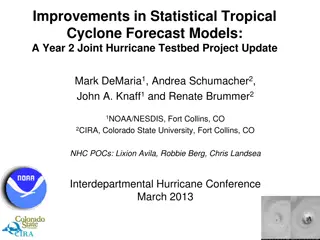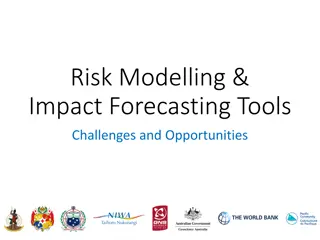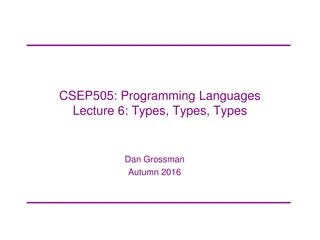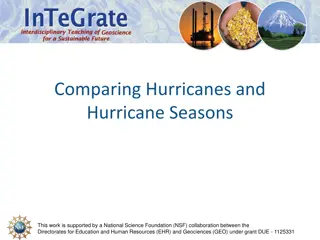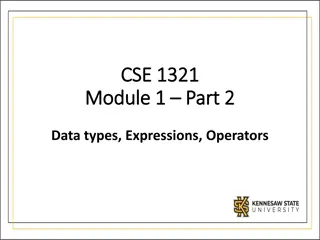Understanding Blood Groups and Their Significance
Human blood types are determined by specific antigens and antibodies present on red blood cells, influencing crucial aspects like blood transfusions and familial relationships in forensic medicine. The ABO system, with its four main blood types (A, B, AB, O), plays a vital role in categorizing blood
7 views • 14 slides
Response to Cyclone Freddy in Malawi: Caritas Malawi's Humanitarian Efforts
Malawi, like other Southern African countries, faces challenges from climate-induced disasters. Caritas Malawi, through the Episcopal Conference of Malawi, has been actively engaged in mobilizing resources for humanitarian aid. Their key interventions include a solidarity visit to affected areas, em
0 views • 8 slides
Malawi Red Cross Society Tropical Cyclone Ana Recovery Plan Overview
Malawi Red Cross Society is responding to the impacts of multiple cyclones in the country, focusing on providing humanitarian assistance, protection support, livelihood support, and access to basic services to affected communities. Over 990,000 people urgently require assistance following damage to
4 views • 10 slides
Understanding Instruction Set Architecture and Data Types in Computer Systems
In computer architecture, the Instruction Set Architecture (ISA) level is crucial in defining how a processor executes instructions. This includes the formal defining documents, memory models, registers, and various data types that can be supported. The ISA level specifies the capabilities of a proc
2 views • 13 slides
Understanding Hotel Classification and Types
Hotel classification and types cover various aspects such as facilities, services, amenities, guest types, and factors influencing hotel classification. From resort hotels to airport hotels and city center accommodations, each hotel type serves different purposes and caters to diverse guest preferen
0 views • 44 slides
Comprehensive Guide to Wound Care: Types, Dressings, and Practices
Understanding wound care is crucial for proper healing. This guide covers types of wounds, purposes of wound dressing, different dressing types, and helpful practice guidelines. Learn about intentional and unintentional wounds, dressing purposes like protection and absorption, and types of dressings
1 views • 10 slides
Understanding Contract Types and Incentives Under ProTech
Explore the factors influencing contract types selection, including price competition, cost analysis, and technical capability. Learn about different contract types like fixed-price and cost-reimbursable, each with unique characteristics and risks. Discover the spectrum of contract types and incenti
0 views • 21 slides
National Cyclone Risk Mitigation Project Phase I Summary
The National Cyclone Risk Mitigation Project (NCRMP) aims to reduce cyclone risk and vulnerability in coastal areas by developing an Early Warning Dissemination System, constructing cyclone risk mitigation infrastructure, and building capacity in coastal communities. Phase I in Andhra Pradesh and Od
0 views • 31 slides
National Cyclone Risk Mitigation Project Update
The National Cyclone Risk Mitigation Project aims to reduce cyclone risks and build resilience in coastal areas through components like Early Warning Dissemination System and Cyclone Risk Mitigation Infrastructure. This update covers progress on awarding contracts, site identification, equipment pro
0 views • 30 slides
Impact of Catastrophic Events on Ecosystems
Catastrophic events like floods, hurricanes, and tornadoes have significant impacts on ecosystems, affecting physical structures, crops, food supplies, vegetation, animal species, disease, famine, and even land features. Hurricanes, for example, cause erosion, disrupt bayous, contaminate water, and
0 views • 22 slides
Understanding Extra-Tropical Cyclones and Anticyclones
Extra-Tropical Cyclones (ETC) occur outside tropical regions and are associated with fronts, unlike hurricanes. The Norwegian Cyclone Model explains the lifecycle of ETCs, starting at the polar front and describing cyclogenesis through wind shear patterns.
2 views • 75 slides
Exploring C Program Refinement Types with Liquid Types and Invariant Discovery
Discover the integration of Liquid Types and Refinement Types in C programming through Invariant Discovery, leading to automatically adapting C programs to fit Liquid Types. Explore challenges and solutions in expressing invariants, handling unknown aliasing, and implementing strong updates within t
0 views • 24 slides
Atlas HR eServices - Leave Types and Application Procedures
This content provides detailed information on various leave types and application procedures within the Atlas HR eServices platform. It covers topics such as Jury Duty Leave, Compensatory Day Off, Floating Holiday (NY), Official Business, Rest & Recuperation, along with guidelines on how to apply fo
0 views • 12 slides
Enhancements to COAMPS Tropical Cyclone Forecasting Methods
This presentation discusses the application of new methodologies in COAMPS for improving tropical cyclone forecasting. It covers synthetic TC observations, analysis with NAVDAS, and the real-time run methodology for generating initial fields in the model. The incorporation of observations and TC syn
0 views • 21 slides
Understanding Existential Types and Type Manipulation in Programming Languages
Explore the concepts of existential types, type abstraction, type ambiguity, packing, and unpacking in the context of programming languages. Learn how to work with hidden types, universal types, and the nuances of type manipulation. Examples and illustrations are provided to enhance understanding.
0 views • 17 slides
Campus Journals and General Ledger Overview
Campus Journals in September 2014 cover various topics such as Icebreaker activities, Ground Rules, Safety procedures, Disclaimers, Class Format, Agenda for the session, Campus Journal types, and Transaction Types. The content includes descriptions of different journal types and transaction types, a
0 views • 43 slides
PREDICT: Pre-Depression Investigation of Cloud Systems in the Tropics
PREDICT is an NSF project focusing on investigating tropical cloud systems to better understand tropical cyclone formation. It builds on previous field campaigns and modeling activities, aiming to test hypotheses, explore different genesis pathways, and advance our understanding of the processes inv
0 views • 10 slides
Understanding Precipitation: Forms and Types Explained
Precipitation, any form of moisture reaching Earth's surface from the atmosphere, encompasses various types like rain, snow, drizzle, glaze, sleet, and hail. Each type has unique characteristics, densities, and formation processes. Additionally, precipitation can be classified into convection, cyclo
1 views • 38 slides
Understanding Cyclones: Formation and Impact
Cyclones are powerful atmospheric disturbances characterized by swirling winds and heavy rainfall. They form in warm sea conditions and progress through stages of formation, maturity, and decay. Various names are used based on location. Understanding cyclone formation helps in preparing for and mana
0 views • 18 slides
Leica Cyclone Server Installation Guide - Version 2020.1.0
Detailed instructions for installing Leica Cyclone 2020.1.0 on a server, configuring databases, and setting up client workstations. The guide covers steps from downloading the installer to configuring user folders on the server. Learn to set up Cyclone efficiently for your organization's needs.
0 views • 10 slides
Sensitivity of Ocean Sampling for Coupled COAMPS-TC Prediction Study
This study explores the optimal ocean sampling strategy for Hurricane Isaac (2012) using high-resolution in-situ observations. It investigates the sensitivity of tropical cyclone intensity change through assimilation of AXBT, AXCTD, and AXCP observations. Results show significant impact areas along
0 views • 12 slides
Advances in Tropical Cyclone Radar Rainfall Estimation
Reviewing past methods and introducing new tools for radar rainfall estimation in tropical cyclones. Discusses advancements in Dual Polarization rainfall estimation and NSSL's National Mosaic & Multi-Sensor Quantitative Precipitation Estimation. Includes insights on reflectivity-to-rainfall relation
0 views • 28 slides
Research on Stratospheric Polar Vortex and TPVs for Arctic Cyclone Predictability
This research aims to enhance predictability of Arctic cyclones by studying the Stratospheric Polar Vortex and Tropopause Polar Vortices (TPVs). The presence of strong westerly winds in the stratosphere during fall leads to anomalous cold air outbreaks in mid-winter. TPVs serve as precursors to arct
0 views • 4 slides
Modular Modeling of Tropical Cyclone Structure: Supporting Global Hawk Missions
This text discusses the challenges in forecasting tropical cyclone intensity and proposes an intermediate approach between detailed simulations and empirical correlations. It highlights the Global Hawk UAV's capabilities for storm tracking and data collection, emphasizing the importance of adapting
0 views • 28 slides
Understanding Java Data Types and Variable Declaration
Dive into the world of Java data types and variable declaration with this comprehensive guide. Learn about primitive data types, declaring variables, integer types, floating-point data types, character data type, and boolean data type. Master the art of assigning names and data types to efficiently
0 views • 31 slides
National Workshop Series on COVID-19 Survey Impact and Response Planning
Organize a series of national workshops for Pacific Island Countries (PICs) to align survey activities, provide feedback on Rapid Assessment Surveys, and plan responses to COVID-19 and Cyclone Harold. Key stakeholders include government statisticians, NSO staff, senior officials, and development par
0 views • 7 slides
Understanding Arrays of Objects and Primitive Types
Arrays of objects provide a way to store and manage multiple instances of complex data types, similar to arrays of primitive types. This content explores the concept of arrays of objects, how to declare and allocate memory for them, and how to work with arrays of primitive types like double and int.
0 views • 25 slides
Improvements in Statistical Tropical Cyclone Forecast Models Update
This update discusses improvements in statistical tropical cyclone forecast models as part of the Year 2 Joint Hurricane Testbed Project. It covers tasks such as extended range baseline models, updating databases, and trajectory approaches for baseline models. The project aims to enhance the accurac
0 views • 19 slides
Data Types, Expressions, and Operators in Java
This resource provides information on data types, expressions, and operators in Java. It covers topics such as data types (int, double, String, boolean), operator precedence, and practice problems to work on expressions and types. The content includes announcements, reminders, a recap of data types,
0 views • 20 slides
Understanding Data Types and Operations in C Programming for Embedded Systems
Explore the importance of selecting appropriate data types and bitwise operations in C programming for embedded systems. Learn about the sizes of data types, performance considerations, ANSI C integer data types and their ranges, handling overflow issues, and coercion in programming. Enhance your kn
0 views • 17 slides
Understanding Haskell Types, Classes, Functions, and Polymorphism
In Haskell, types are collections of related values, ensuring type safety through compile-time type inference. Type errors occur when functions are applied to arguments of the wrong type. Annotations help define types, and Haskell offers basic types like Bool, Char, String, Int, Integer, Float, and
0 views • 30 slides
Understanding Types and Classes in Haskell Programming
Types in Haskell are names for collections of related values, allowing for safer and faster programs by catching errors at compile time. Haskell supports basic types like Bool, Char, String, Int, Integer, and Float, as well as list and tuple types. Type errors occur when functions are applied to arg
0 views • 27 slides
Challenges and Opportunities in Risk Modelling & Impact Forecasting Tools
The challenges and opportunities in risk modelling and impact forecasting tools are highlighted, focusing on the impacts of Tropical Cyclone Winston in Fiji. The need for improved data-sharing procedures and protocols, partnerships, and a centralized database are identified to enhance risk informati
0 views • 5 slides
Understanding Types in Programming Languages: Lecture Insights
The lecture delves into the intricacies of types in programming languages, focusing on simply-typed Lambda-Calculus, safety, preservation, progress, and extensions like pairs, datatypes, and recursion. It discusses static vs. dynamic typing, Curry-Howard Isomorphism, subtyping, type variables, gener
0 views • 73 slides
The Economic Impact of Hurricane Sandy: A Comprehensive Analysis
Hurricane Sandy, a post-tropical cyclone that hit the Caribbean and the US East Coast in 2012, caused widespread economic devastation. With damages totaling billions of dollars, the storm significantly affected small businesses, infrastructure, and communities in its path, particularly in New York a
0 views • 11 slides
Understanding Hurricane Seasons and Comparing Hurricanes
This work explores the characteristics of hurricanes, the Saffir-Simpson Scale, Accumulated Cyclone Energy, and examples from the 2011 hurricane season. It delves into hurricane formation, impact on land, and the importance of seasonal outlooks in predicting and preparing for hurricanes. The collabo
0 views • 14 slides
Understanding Tropical Cyclones and Layers of the Atmosphere
Tropical cyclones are warm-core low-pressure systems that form over oceans with high sea surface temperatures. The Philippines is prone to these cyclones, leading to heavy rains, flooding, and strong winds. The layers of the atmosphere, from the exosphere to the troposphere, play crucial roles in sh
0 views • 7 slides
Understanding Type Conversions in ANSI C Programming
This content delves into type conversions in ANSI C programming, covering automatic and explicit conversions, unary and binary conversions, with examples and explanations. It discusses how different data types are handled in arithmetic operations, including the promotion of lower types to higher typ
0 views • 10 slides
Introduction to Python Data Types, Operators, and Expressions
Understanding data types, expressions, and operators is fundamental in Python programming. Learn about Python's principal built-in types such as numerics, sequences, mappings, and classes. Explore numeric types, strings, and their operations like concatenation, escape sequences, and conversions betw
0 views • 20 slides
Mayotte in cyclone aftermath
The death toll from Cyclone Chido's rampage through the French overseas territory of Mayotte remains unclear, with shantytowns that were home to undocumented migrants flattened and many areas still inaccessible.
0 views • 17 slides







